For the 2025 school year, there are 3 public preschools serving 791 students in Warren County Schools School District. This district's average pre testing ranking is 1/10, which is in the bottom 50% of public pre schools in North Carolina.
Public Preschools in Warren County Schools School District have an average math proficiency score of 20% (versus the North Carolina public pre school average of 51%), and reading proficiency score of 25% (versus the 46% statewide average).
Minority enrollment is 87% of the student body (majority Black), which is more than the North Carolina public preschool average of 59% (majority Black and Hispanic).
Overview
This School District
This State (NC)
# Schools
6 Schools
994 Schools
# Students
1,686 Students
464,055 Students
# Teachers
109 Teachers
33,275 Teachers
Student : Teacher Ratio
15:1
15:1
District Rank
Warren County Schools School District, which is ranked within the bottom 50% of all 320 school districts in North Carolina (based off of combined math and reading proficiency testing data) for the 2021-2022 school year.
The school district's graduation rate of 65-69% has decreased from 75-79% over five school years.
Overall District Rank
#303 out of 325 school districts
(Bottom 50%)
(Bottom 50%)
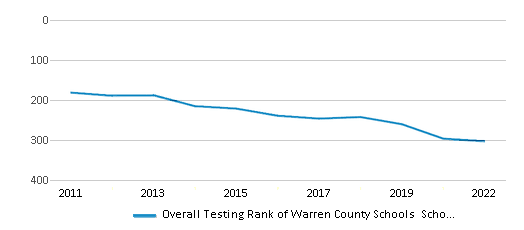
Math Test Scores (% Proficient)
18%
51%
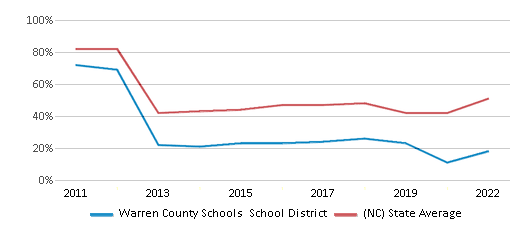
Reading/Language Arts Test Scores (% Proficient)
30%
50%
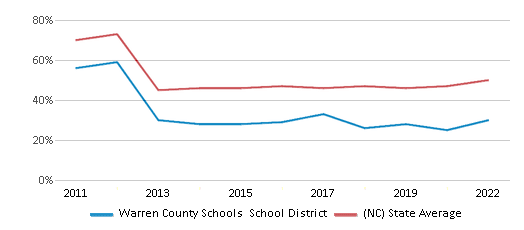
Science Test Scores (% Proficient)
36%
63%
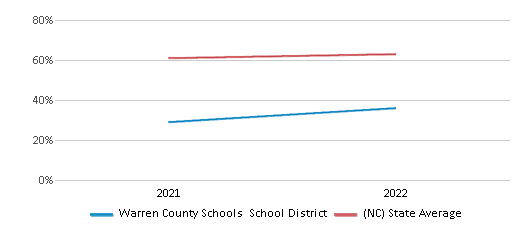
Graduation Rate
65-69%
86%
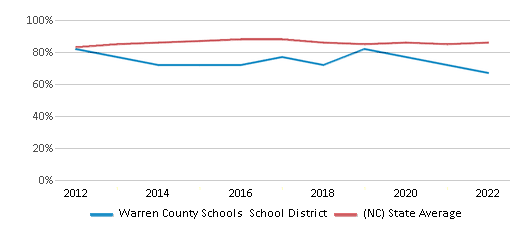
Students by Ethnicity:
Diversity Score
0.52
0.72
# American Indian Students
92 Students
6,572 Students
% American Indian Students
6%
1%
# Asian Students
13 Students
18,458 Students
% Asian Students
1%
4%
# Hispanic Students
160 Students
105,943 Students
% Hispanic Students
10%
23%
# Black Students
1,140 Students
114,509 Students
% Black Students
67%
25%
# White Students
193 Students
189,147 Students
% White Students
11%
41%
# Hawaiian Students
2 Students
648 Students
% Hawaiian Students
n/a
n/a
# Two or more races Students
92 Students
28,778 Students
% of Two or more races Students
5%
6%
Students by Grade:
# Students in PK Grade:
83
23,104
# Students in K Grade:
117
72,144
# Students in 1st Grade:
114
74,289
# Students in 2nd Grade:
112
75,942
# Students in 3rd Grade:
126
68,925
# Students in 4th Grade:
111
69,686
# Students in 5th Grade:
128
66,668
# Students in 6th Grade:
115
5,021
# Students in 7th Grade:
126
3,684
# Students in 8th Grade:
127
3,629
# Students in 9th Grade:
148
214
# Students in 10th Grade:
131
194
# Students in 11th Grade:
128
187
# Students in 12th Grade:
120
368
# Ungraded Students:
-
-
District Revenue and Spending
The revenue/student of $17,240 is higher than the state median of $11,187. The school district revenue/student has grown by 6% over four school years.
The school district's spending/student of $15,848 is higher than the state median of $11,612. The school district spending/student has grown by 6% over four school years.
Total Revenue
$29 MM
$17,307 MM
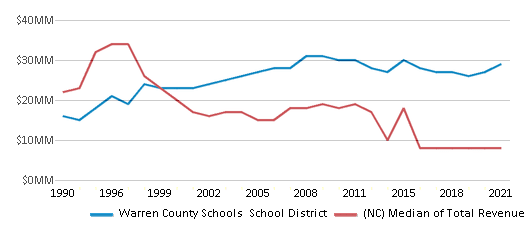
Spending
$27 MM
$17,964 MM
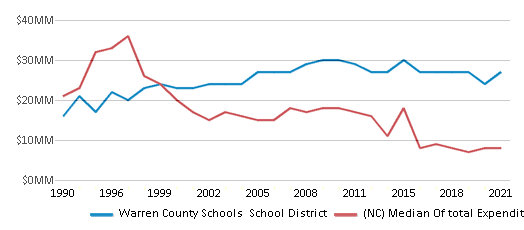
Revenue / Student
$17,240
$11,187
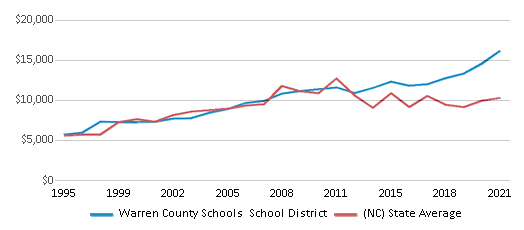
Spending / Student
$15,848
$11,612
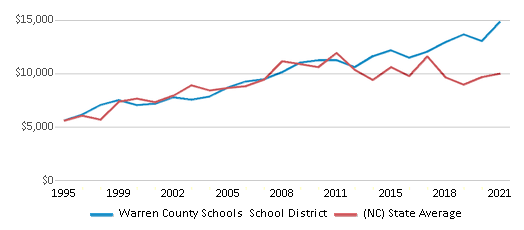
Best Warren County Schools School District Public Preschools (2025)
School
(Math and Reading Proficiency)
(Math and Reading Proficiency)
Location
Grades
Students
Rank: #11.
Vaughan Elementary School
(Math: 25-29% | Reading: 30-34%)
Rank:
Rank:
2/
Bottom 50%10
2936 Us Hwy 158e
Macon, NC 27551
(252) 257-6802
Macon, NC 27551
(252) 257-6802
Grades: PK-5
| 157 students
Rank: #22.
Northside Elementary School
(Math: 20% | Reading: 28%)
Rank:
Rank:
1/
Bottom 50%10
164 Elementary Ave
Norlina, NC 27563
(252) 456-2656
Norlina, NC 27563
(252) 456-2656
Grades: PK-5
| 309 students
Rank: #33.
Mariam Boyd Elementary School
(Math: 15-19% | Reading: 15-19%)
Rank:
Rank:
1/
Bottom 50%10
203 Cousin Lucy's Lane
Warrenton, NC 27589
(252) 257-3695
Warrenton, NC 27589
(252) 257-3695
Grades: PK-5
| 325 students
Recent Articles

Sexual Harassment at Age 6: The Tale of a First Grade Suspension
A six-year old in Aurora, Colorado, was suspended after singing an LMFAO song to a little girl in his class and reportedly “shaking his booty.” We look at the case and the sexual harassment problem in public schools today.

How Scaffolding Could Change the Way Your Child Learns
This article explores the concept of instructional scaffolding, a teaching method that enhances learning by breaking down complex tasks into manageable parts. It highlights how scaffolding supports students in developing critical thinking skills and becoming more independent learners. The article discusses the benefits of scaffolding, including improved engagement and reduced anxiety, and provides strategies for its implementation across various educational levels.

February 05, 2025
Understanding the U.S. Department of Education: Structure, Impact, and EvolutionWe explore how the Department of Education shapes American education, from its cabinet-level leadership to its impact on millions of students, written for general audiences seeking clarity on this vital institution.





